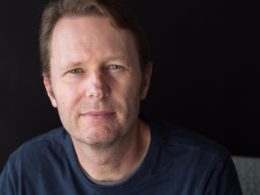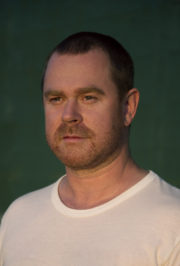David McCooey
 David McCooey is a prize-winning Australian poet and critic. His latest collection of poems, Outside (2011), was shortlisted for the Queensland Literary Awards and was a finalist for the 2012 Melbourne Prize for Literature’s Best Writing Award. His first collection, Blister Pack (2005) won the Mary Gilmore Award and was shortlisted for four major national literary awards. McCooey is the deputy general editor of the prize-winning Macquarie PEN Anthology of Australian Literature (2009). His album of “poetry soundtracks”, Outside Broadcast, was released in 2013 as a digital download. He is a Professor of Literature and Writing at Deakin University in Geelong, Victoria, where he lives.
David McCooey is a prize-winning Australian poet and critic. His latest collection of poems, Outside (2011), was shortlisted for the Queensland Literary Awards and was a finalist for the 2012 Melbourne Prize for Literature’s Best Writing Award. His first collection, Blister Pack (2005) won the Mary Gilmore Award and was shortlisted for four major national literary awards. McCooey is the deputy general editor of the prize-winning Macquarie PEN Anthology of Australian Literature (2009). His album of “poetry soundtracks”, Outside Broadcast, was released in 2013 as a digital download. He is a Professor of Literature and Writing at Deakin University in Geelong, Victoria, where he lives.
‘Whaling Station’ Redux
i)
What trash, that poem of mine about the whaling station
we visited in Albany in the primitive 1970s, those years
when an operational slaughterhouse could be a family
tourist attraction. My late father’s legacy of 35mm slides,
newly digitised, undoes my poem, with three shots—
miraculous and amoral—of butchered whales,
a shock defacement of poetry’s mouthy reckoning.
ii)
In the first capture, there are winches, wire, a stone wheel
(for sharpening things, I imagine), rust-coloured concrete,
a fibro building, and the figures of two blue-singleted men
in gumboots, one bending, both partly obscured by steam rising
from blocks of whale meat. The steam has a pink colouration.
iii)
The second capture suffers from camera shake,
that analogue of nausea, and shows two men with metal bars
prying into the whale’s remains. Above them are
the innocent clouds, a seabird with extended wings.
iv)
In the third capture, two boys are in the frame. They could be,
but are not, my brother and me. They are looking at a single carcass:
headless, flayed, and eviscerated, the mess of it
rendered into dreadful blacks, reds, and whites.
In the centre of the whale the JPEG clips to pure black.
v)
I was five years old when I was taken to witness this industry of men.
When I show my father’s photographs to my six-year-old son,
I skip past these three images, momentarily panicky.
My blonde son, intent on the screen, wants to know what
he’s just seen, but does not argue when I tell him it’s not for him.
We move on to a grainy shot of Uncle Mac—who was no blood relation,
but shared my father’s name—standing before the Arc de Triomphe.
Europe
The grey and the green
under the white of the sky,
and over the black of the earth.
The annual pogrom of Autumn.
Soldiers in the fog;
soldiers marching
in the guiltless dusk.
The storybook animals
living in bungalows.
The night birds singing
their repetitive songs.
 Stuart Barnes was born in Hobart, Tasmania, and educated at Monash University. Since 2013 he has lived in Central Queensland and been poetry editor for Tincture Journal. His manuscript The Staysails won the 2015 Arts Queensland Thomas Shapcott Poetry Prize, resulting in the publication of his first book, Glasshouses (UQP, August 2016). His website is
Stuart Barnes was born in Hobart, Tasmania, and educated at Monash University. Since 2013 he has lived in Central Queensland and been poetry editor for Tincture Journal. His manuscript The Staysails won the 2015 Arts Queensland Thomas Shapcott Poetry Prize, resulting in the publication of his first book, Glasshouses (UQP, August 2016). His website is 


